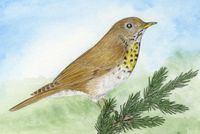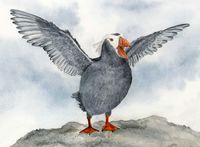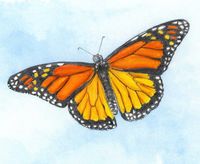
Beluga
Latin name: Delphinapterus Leucas ,Conservsation status: near threatened (population is unknown)
Belugas make such a variety of sounds—clicks, twitters, whistles, and mimics of other sounds—they have been nicknamed "sea canaries." As much as 40% of their body mass is blubber, which stores energy and keeps them warm in temperatures as low as 0 °C. The smallest whale on the planet, a baby Beluga gains up to 200 pounds a day.
Belugas live in Arctic and Sub-Arctic waters. Impacts from climate change include: an increase in ship traffic as sea ice declines, oil exploration and extraction, fisheries by-catch, and disruption of the food web. As Arctic waters warm and currents change, the Humpback (a competitor) and the Orca (a predator) may move north and stay longer. Some Beluga populations are also threatened by hunting, pollution and habitat loss.
Other animals effected by climate change
 Bicknells Thrush
Bicknells ThrushThe breeding habitat of Bicknell's Thrush is primarily restricted to mountain spruce forests of Northeastern US and Canada. They winter in the Caribbean and spring migration north is cued by day length. If spring arrives early in the north and the Thrushes arrive at their normal time, the abundance of food—insects and fruit—would already have peaked. Warming temperatures also produce an abundance of spruce and fir cones—feeding and increasing the population of Red Squirrels, a main predator of eggs and chicks. Storms and hurricanes threaten the Thrush's tropical winter habitat. Pollution, logging and deforestation threaten their spring breeding and winter habitats.
 Tufted Puffin
Tufted PuffinTufted Puffins are threatened by sea level rise and storm surges which destroy habitats and breeding areas. In some areas of North America warming seas are causing the fish that the Puffins feed on to migrate farther north, making it difficult for them to find adequate food. Other threats are entrapment in fishing nets, oil spills, pollution, ingestion of plastic, human disturbance of breeding colonies and introduced predators such as rats and foxes.
 Beluga
BelugaBelugas live in Arctic and Sub-Arctic waters. Impacts from climate change include: an increase in ship traffic as sea ice declines, oil exploration and extraction, fisheries by-catch, and disruption of the food web. As Arctic waters warm and currents change, the Humpback (a competitor) and the Orca (a predator) may move north and stay longer. Some Beluga populations are also threatened by hunting, pollution and habitat loss.
 Monarch Butterfly
Monarch ButterflyThe annual North American migration of the Monarch is listed as a "threatened phenomenon." Climate related threats include: drought, storms, changes in precipitation and dependence on temperature to trigger migration and reproduction. The Monarch feeds and lays eggs exclusively on milkweed plants, so it is also highly vulnerable to herbicides and habitat destruction.
